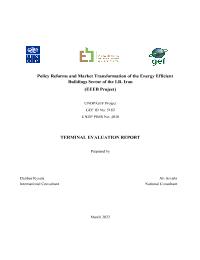
Final Review of the Energy Efficiency in Building Sector Project
Completedon 31 Mar, 2022
Evaluation Plan
Planned End Date
Jun 2022
Evaluation Type
Project
Management Response
Yes
Evaluation Budget
$35,000
Evaluation Title
Final Review of the Energy Efficiency in Building Sector Project
Quantum Project Number
00080660
Plan Period
Status
Completed
Type
Project
Plan Date
30 Jun, 2022
Completion Date
31 Mar, 2022
Budget
$35,000
Expenditure
$35,000
Management Response
Yes
Quality Assessment
Yes
Joint Programme
No
Joint Evaluation
No
GEF Evaluation
Yes
Expand
Countries
Iran
Quantum Project Number
00080660
Plan Period
Status
Completed
Type
Project
Management Response
Yes
Plan Date
30 Jun, 2022
Quality Assessment
Yes
Completion Date
31 Mar, 2022
Joint Programme
No
Joint Evaluation
No
Budget
$35,000
GEF Evaluation
Yes
Expand
Expenditure
$35,000
Countries
Iran
Output 2.1.1 Low emission and climate resilient objectives addressed in national, sub-national and sectoral development plans and policies to promote economic diversification and green growth
Goal 13. Take urgent action to combat climate change and its impacts
13.2 Integrate climate change measures into national policies, strategies and planning
1: Others
2: Poverty


